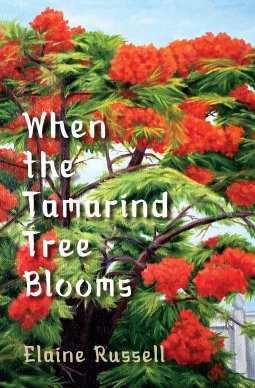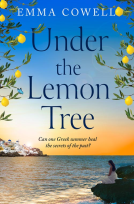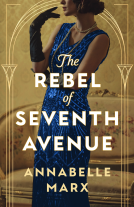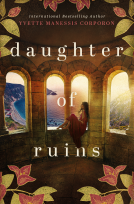
When the Tamarind Tree Blooms
by Elaine Russell
This title was previously available on NetGalley and is now archived.
Send NetGalley books directly to your Kindle or Kindle app
1
To read on a Kindle or Kindle app, please add kindle@netgalley.com as an approved email address to receive files in your Amazon account. Click here for step-by-step instructions.
2
Also find your Kindle email address within your Amazon account, and enter it here.
Pub Date Jan 04 2024 | Archive Date Apr 24 2024
Belles Histoires | Independent Book Publishers Association (IBPA), Members' Titles
Talking about this book? Use #WhentheTamarindTreeBlooms #NetGalley. More hashtag tips!
Description
Geneviève Dubois, half-Lao, half-French, turns eighteen and leaves the French orphanage where she has been trapped for fourteen unhappy years. She is determined to uncover the story of her parents and locate her missing twin brother. Stepping into the deeply divided world of 1931 French colonial Laos, she finds neither French colons nor native Lao readily accept her mixed heritage. Even falling in love is fraught with the cultural restrictions of two dissonant societies. Where does she fit in?
A Note From the Publisher
Cover art by Jackie Pope
Marketing Plan
I'm planning to hire a publicist to help. But it will be on Facebook and Instagram and other social media.
I'm planning to hire a publicist to help. But it will be on Facebook and Instagram and other social media.
Available Editions
| EDITION | Paperback |
| ISBN | 9781732499492 |
| PRICE | $21.00 (USD) |
| PAGES | 400 |
Available on NetGalley
Featured Reviews
 Amal H, Reviewer
Amal H, Reviewer
Thiis book is so interesting especially the talk about the Métis people and the orphanage life …sakuna of Lao is such a strong-willed girl!!! Thank you so much for this precious knowledge
 Beril Ece K, Educator
Beril Ece K, Educator
"When the Tamarind Tree Blooms" presents a compelling narrative that delves into themes of identity, heritage, and belonging against the backdrop of 1931 French colonial Laos. What I particularly enjoyed about this story is the protagonist's journey of self-discovery as she navigates the complexities of her mixed heritage and searches for her family. Geneviève's determination to uncover the truth about her parents and locate her missing twin brother drives the narrative forward, leading her into a deeply divided society where acceptance is elusive. The exploration of cultural tensions and the clash between French and Lao traditions adds depth to the story, offering insights into the challenges faced by individuals caught between two worlds. As Geneviève grapples with questions of where she belongs and who she is, readers are drawn into a captivating tale of resilience, love, and the pursuit of identity in the face of adversity.
 Ethel F, Reviewer
Ethel F, Reviewer
This was a superb book one I would highly recommend. I have left a rather lengthy review on Goodreads if you care to read it. My thanks to NetGalley for the opportunity to read this ARC in exchange for an honest review.
My thanks to NetGalley and Belles Histoires for an ARC of this book.
The tamarind tree of the title is a beautiful, hardy tree that blooms in spectacular flowers every May. Laya tells her four year old daughter, Genevieve Dubois, that she will come for her “when the tamarind tree blooms again.” Genevieve is taken from her home to a girls’ orphanage expressly set up by the French Colonial government of Laos for ‘neglected’ Métis children, those of Lao mothers and French fathers, mostly the offspring of servants exploited by their married masters. She remembers little of her mother, not even her name, and nothing of her father or any other family. She grows into a beautiful, intelligent and spirited young woman within the cloister of the strict Catholic orphanage, where the students are turned into “French citizens” by means of a forcible forgetting of their personal history, culture, and language. But every May through the 14 years before her ‘emancipation,’ Genevieve looks for her mother.
Métis children, especially girls, represent the worst of racism and colonialism to both the Lao people and their French colonizers. They fit nowhere and face disrespect and abuse everywhere. The orphanage is an unloving, isolating place that holds little happiness, but they at least receive thing an excellent French education, however little it prepares them for the world outside its gates.
As the story opens in May 1931, Genevieve will soon be 18 and free to leave. She wants only to get out, work to save money for university, and, most of all, find her parents. She is now also entitled to any information the government has collected regarding her family of origin. But the Director, whom she has crossed on various occasions, refuses to give her the file that she longs to see. Genevieve’s compulsive nature leads her to steal it, she and her best friend are caught. This sets in motion a series of events not at all resembling the plans that have been made to get her started in the best possible direction. The only hope that remains is that one of her teachers, the young and lovely Catherine Courbet, offers her temporary shelter in her own home, and promises to inquire about suitable employment among her well-set French friends.
Genevieve Dubois’ new life is filled with challenges, some of them soul-crushing, most of them resulting from the racism, sexism, and rigid class hierarchies among both the Lao and the French. She endures much, and sees many false hopes collapse, including her precarious romance with a Lao prince. Through it all, she refuses to surrender her dreams of family reunion and a life worthy of her intelligence.
Although Elaine Russell is not Lao, her biography indicates her deep appreciation for, and first hand knowledge of, Lao culture and the history of French involvement in Indochina. She does not stint in showing the damage that was done and the conflicts initiated in the 19th century that, by the time of Genevieve’s coming of age, were being worsened by the collapse of world markets. Her portrayal of women’s lives, especially those of Metisse girls like Genevieve, is very sensitive. An amazing young woman, Genevieve conducts herself with integrity as she struggles to find out about a past deliberately kept from her, and to choose what it will make her in the present. At times she comes across as too aware of how the others define her as a Métisse, then just as quickly tells herself that being friendlier and more confident will win over the most abject racists. For a highly intelligent girl, she makes some really stupid choices. What the author really succeeds at is demonstrating the hypocrisy and immorality that lead both the Lao and the French elite to flout their own laws and social mores without compunction. The ending is satisfying, but hints at a second volume to enjoy in future. This is a beautiful story and very much worth reading, especially if, like me, you have little knowledge of the history of Indochina and its oppressed people.
 Karen C, Educator
Karen C, Educator
This novel is set in 1931 French Colonial Laos, and is about a young woman who has just turned 18 and leaves the orphanage where she lived since she was four, in search of answers about her past. Geneviève embarks on a journey of self discovery, where she comes from, who she comes from, and what she wants for her future. Though thwarted in this quest, she is determined to find some of these answers. French Colonial Laos was a divided society, both in language and culture as well as in the treatment of those people, like Geneviève, who was born to a native mother and French father. Finding acceptance in a world complicated by colonialism and an understanding of her Laos culture is at the heart of this story.
Trigger warnings: sexual assault, racism
When the Tamarind Tree Blooms is the story of Geneviève Dubois, nicknamed Vivi, a métisse girl who has been raised in an orphanage for most of her life. There, she was forced to leave behind half of her heritage, thaught to embrace her French citizenship and leave behind her Lao heritage. She turns 18 during the great depression and, finally free from the orphanage, she wants to learn more about her parents, her story, and who she is. It is a coming of age story with deep messages on colonialism, racism and sexism.
It was heartbreaking at times, but in the end, it had a message of hope. When the Tamarind Tree Blooms tells you that life is hard and unfair, but that doesn't mean you should give up. I found it very well written, Elaine Russel did a great job of showing the discrimination and racism métisses faced (and still, to this day, have to live with) in Laos, coming from the French as well as the Lao. You could tell that the author really cares about Laos and it's people, she isn't just using their struggles as a cashgrab.
The characters, especially Vivi, were extremely complex and well written. Vivi is extremely intelligent, but she is also naive after a sheltered life in the orphanage, during which she didn't really get to see the outside world. She is lost as a person, half-lao half-french, but feeling like she belongs with neither, but as the story progresses, she gets stronger and gains an understanding of the cruel world she lives in. I also liked the side arc of her trying to navigate through religion, her beliefs, what it all means. I could definetly relate with that 🙃
I also loved the ending, because it actually ends without leaving you with hundreds of questions or, even worst, a cliffhanger, but it is still open. Geneviève's existence isn't finished, and she still has adventures to live through. She has her whole life ahead of her, but at the same time, you can tell this particular story is concluded.
Thank you to netgalley for the arc!
 Reviewer 1331702
Reviewer 1331702
For those who love historical fiction, this book fit the bill. Taking place in Laos in the early 1930's, it seemed so realistic with the characters experiencing life in an orphanage, coming of age, multiple romances, royalty obligations, travels in the countryside, economic pressures, and temple visits, all under the umbrella of political and class differences. The influence of the French on Laos and its citizens during that time greatly impacted the lives of the characters in this book. Although I appreciated learning more about the historical and racial/class influences, I felt right there with the main characters, having tea in the gardens or eating lunch along the river.
 Julie M, Reviewer
Julie M, Reviewer
French colonial Laos, 1931, is a vibrant and intriguing setting for a young woman’s coming-of-age story. After growing up cloistered in a rigid orphanage, trained to be a ladylike French citizen, Genevieve at 18 is released into the streets of Vientiane without a job and unable to speak Lao. Finding shelter with a single friend, she quickly discovers that both French and Lao shun her as a metisses, or “halfbreed.” As Genevieve explores this new world, searching for clues to her past and learning whom to trust, we get to explore with her. We dance and dine in the exclusive colonial clubhouse, travel through jungle villages built on stilts, and watch sunset glow on the Mekong Delta in a haze of new romance. Genevieve’s journey of discovery, through grief, betrayal, hope and kindness, is a captivating read.
Thank you to NetGalley for an advance copy.
When the Tamarind Tree blooms is the beautifully told story of Genevieve Duboise, a mixed race orphan in Laos who turns 18 and is able to leave the French orphanage she grew up in. Genevieve goes on a journey to find her family, discover what it is to love, and find her place in a world that is not accepting of half Lao half French people.
There is so much about the Lao culture in this book, from their daily life to traditional ceremonies and the food they eat, but it has been weaved effortlessly into a captivating story that kept my attention to the very end. This look into the Lao life style was a major reason I loved this book.
There is a good bit of history weaved into the story, as well, but not enough to feel like I was being educated instead of entertained. I do not like to read something that feels like a history book, and this was perfect for me.
I thought the writing overall was beautiful. Some very mature themes were discussed but in a way that wasn't for shock value and didn't come off as crude. Loss and trauma are part of Genevieve's journey and that made me tear up a couple of times. It read almost like a poem. I will be recommending it to my reader friends.
Readers who liked this book also liked:
Yvette Manessis Corporon
General Fiction (Adult), Historical Fiction, Women's Fiction
Patti Callahan Henry
General Fiction (Adult), Historical Fiction, Women's Fiction


















